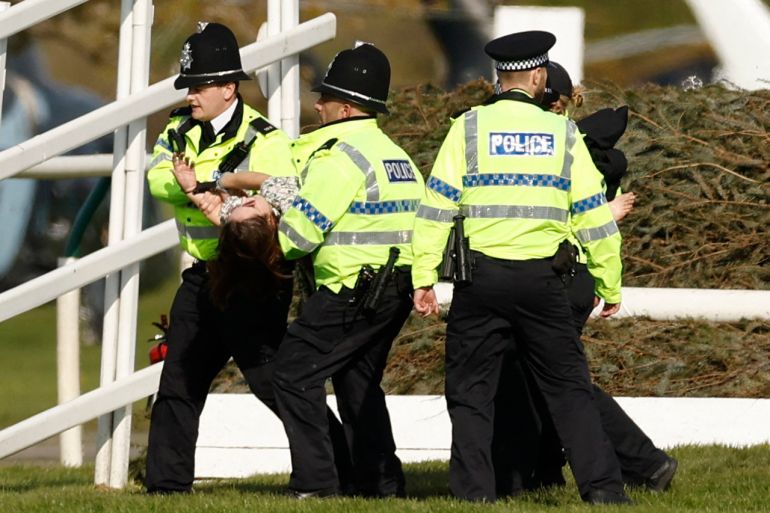Activists delay Grand National horse race, 118 arrested
Animal rights group called for protests against the horse race to demand an end to ‘animal cruelty for entertainment’.

The Grand National, one of the world’s most famous horse races, has been delayed after animal rights activists scaled fences around the perimeter of Aintree racecourse and got onto the track.
A total of 118 people were arrested on Saturday on suspicion of criminal damage and public nuisance offences in a bid to disrupt the race, Merseyside Police said.
Keep reading
list of 4 itemsMongolia puts the brakes on ‘dangerous’ winter horse racing
Mongolia’s child jockeys risk death to race
In Pictures: Senegalese jockey dreams of international glory
Many activists from an estimated group of 300 climbed the high fences around the racecourse and got onto the track a few minutes before the race was scheduled to start. Some affixed themselves to the race fences using glue and lock-on devices, according to the Animal Rising organisation, before being taken away by police and security officials.
Police and security officials were seen stopping other activists and shaking the perimeter fences to prevent others mounting them.
The race was delayed as a result and the 39 horses were kept in the parade ring. It was originally scheduled to begin at 5:15pm local time (16:15 GMT).
The race started around 15 minutes late after the jockeys returned to the paddock, drawing a huge roar from the crowd.
Corach Rambler, ridden by Derek Fox, stormed to victory. The 8-1 shot burst clear off the last fence and won comfortably from 20-1 chance Vanillier, with Gaillard Du Mesnil in third place.
Earlier on Saturday, a 25-year-old woman and a man were arrested earlier protesting outside Aintree racecourse near Liverpool, northwest England where the famous steeplechase takes place.
A 33-year-old woman was also arrested in the Greater Manchester area “in connection with potential coordinated disruption activities” at Aintree, police said. Their names were not disclosed.
Animal Rising had called on protesters to gather outside the racecourse to demand an end to “animal cruelty for entertainment”. The group tweeted a video that it said shows one of its spokespeople being arrested at the protest.
Claudia, one of our spokespeople, has just been arrested, for speaking out about the cruelty that is about to unfold on the track at Aintree. Thank you for trying to protect the horses Claudia. Please sign our petition to Cancel the Grand National 📷 https://t.co/cic6k0eiar pic.twitter.com/1CJ5alYaZS
— Animal Rising (@AnimalRising) April 15, 2023
Police said they have been working with race organisers ahead of and during the Grand National Festival, which started on Thursday.
“We respect the right to peaceful protest and expression of views,” Merseyside Police said, “but criminal behaviour and disorder will not be tolerated and will be dealt with robustly.”
Animal Rising activist Alex Lockwood this week told British radio station talkSPORT that they planned to disrupt the Grand National, arguing that standing outside and handing out fliers “never stopped anything”.
Further inflaming matters was the news that two horses – Dark Raven and Hill Sixteen – died in races at Aintree on Saturday. Hill Sixteen was in the field for the Grand National and died after sustaining an “unrecoverable injury,” organisers said.
On Thursday, another horse – Envoye Special – suffered a fatal injury in the Foxhunters’ Chase, which is run over the fences used for the Grand National.
“This horrific ‘sport’ continues to take lives right in front of our eyes. It’s time to BAN this horrific industry,” Animal Rising wrote on Saturday.
The Grand National, among the biggest occasions on the British sporting calendar, is regarded as one of the most dangerous horse races in the world because of the size of the fences.
Changes were made in 2012 to make the course safer, including softening some of the fences, after two horses died in the Grand National that year and in 2011.
There have been four fatalities from 356 runners in the nine Grand Nationals since.
Four horses died at the Aintree festival last year, including two who were injured in the Grand National.